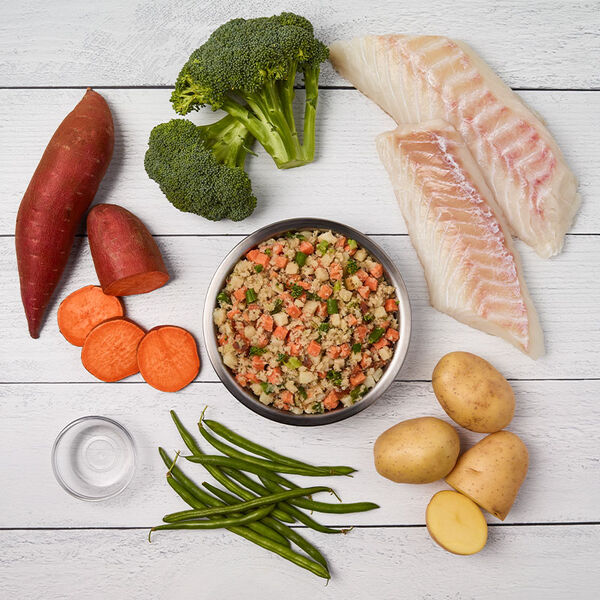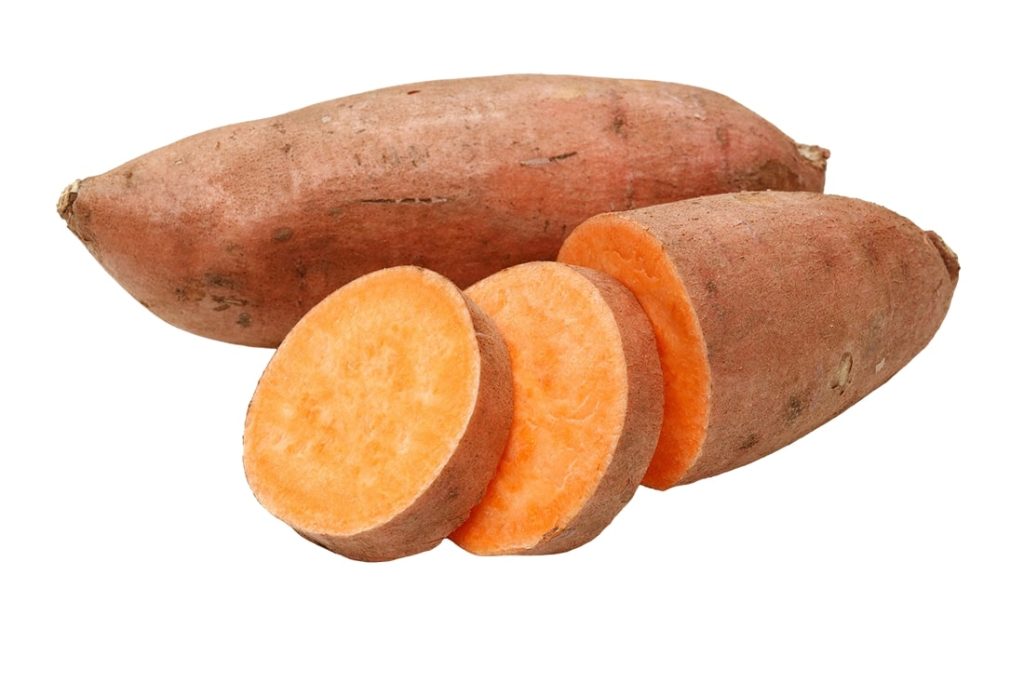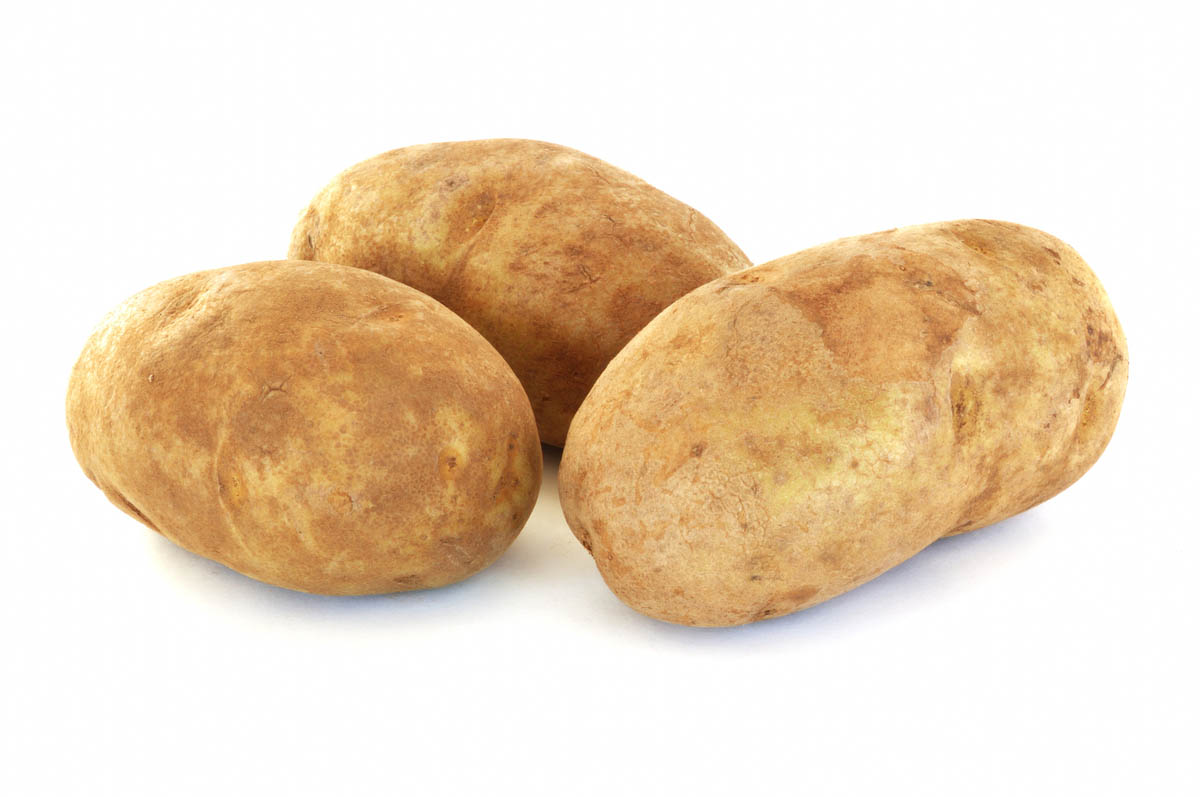A varied diet is the best way for dogs to get all the nutrients they need and maintain top-tier pet health. A single type of dog food is rarely enough to meet their needs, let alone keep them satisfied! Russet potatoes are a human food that’s safe for dogs and tick all the boxes for healthy and delicious.
A healthy dog diet consists of six basic components: water, protein, fat, carbohydrates, vitamins, and minerals. Choosing dog food that utilizes high-quality ingredients and varied sources of these nutrients is the best way to maximize dog nutrition.
Are Russet Potatoes Safe For Dogs?
Plain, cooked russet potatoes are completely safe for dogs and actually have health benefits to add to doggy diets. Some pet foods, like JFFD’s Beef recipe, contain potatoes. Potatoes contain all kinds of healthy vitamins, minerals, and nutrients essential for a balanced diet and overall health in dogs.
While it is indeed safe to give your dog potatoes, grain-free dry dog food diets that use legumes, potatoes, peas, chickpeas lentils, etc. have been associated with DCM (dilated cardiomyopathy). The FDA has not updated its investigation in some time, so the cause is still unknown.
Can My Dog Eat Potato Skins?
Potato skins are fine for dogs in moderation, but eating large quantities of them could be harmful to your pup. While they would have to eat a really large amount of potato skins to do significant damage, the skins contain oxalates (a poisonous chemical that occurs naturally in some plants) that can cause kidney problems for dogs.
Are Russet Potatoes Good For Dogs?
Yes, plain cooked russet potatoes are good for dogs! These scrumptious spuds are full of vitamins and minerals dogs need, which is why they’re featured in JustFoodForDog’s meals like the popular Beef & Russet Potato recipe. Gluten-free, grain-free, and made with no preservatives, their high-quality and hearty dog food is sure to satisfy your hungry pup.
Benefits of Russet Potatoes For Dogs
Russet potatoes have several health benefits for dogs. They’re a great source of potassium which is an electrolyte dogs need for healthy muscle, nerve, and heart function.
Additionally, russet potatoes contain substantial amounts of vitamin C — an antioxidant important for supporting a healthy inflammatory response and producing collagen for joint and bone health — and vitamin B6, necessary for healthy blood sugar and hormone regulation in dogs as well as nervous system function.
Russet potatoes are also a great source of minerals essential for a healthy dog diet. They’re rich in niacin which promotes healthy skin and metabolism as well as proper digestion, and magnesium for strong and healthy bones. Russet potatoes are also a great source of iron for healthy blood cells and energy production, thiamine for metabolism health, and dietary fiber which benefits healthy digestion and nervous system function in dogs.
Best Ways to Feed Russet Potatoes to Dogs

Plain, peeled, and cooked potatoes are the best and safest way to share them with your dog. As we mentioned, potato skins are fine for dogs in moderation, but large amounts could cause health problems. Removing at least some of the potato skins before sharing spuds with your furry friend is your best bet. Here are some ways for pet owners to share plain potatoes with their pups.
Mashed Potatoes
Plain mashed potatoes without any seasoning, butter, or garlic are a great way to share potatoes with your dog. Add a scoop to their kibble or incorporate it in your homemade dog food recipe to add some yummy nutrients to mealtime.
Baked Potatoes
Baked potatoes, like mashed potatoes, are great to share with dogs as long as they’re cooked plain. Keep the sour cream and green onions for yourself! Plain baked potatoes make a great addition to any doggy dinner.
Homemade Baked Potato Chips
Homemade, baked potato chips without salt, seasoning, or oil are a healthy snack for both you and your dog! They make a great crispy addition to dog food or a crunchy treat you can share with your pup anytime.
Remember! Everything in moderation to avoid obesity.
Prepared Potatoes Not to Share With Pups
Keeping potatoes plain is the safest way for dog owners to share spuds with their pups, but a lot of prepared potatoes don’t exactly come plain. There are a few types of potatoes you don’t want to share with your pup since they may not be prepared with being dog-friendly in mind.
Hashbrowns are generally seasoned and cooked in oil, which can cause an upset stomach in dogs
French fries are also fried in oil which you want to avoid, and which also may be used to fry other things that aren’t good for dogs.
Potato Salad generally contains a lot of seasoning, oil, or dressing that can upset your dog’s stomach.
Are Sweet Potatoes Good For Dogs?

Sweet potatoes are full of health benefits for dogs and are another great source of nutrients. They’re one of the best veggies you can share with your pooch for healthy and hearty nutrition.
Health Benefits of Sweet Potatoes For Dogs
- Potassium for healthy heart, nerves, and muscles
- Vitamin A for immune system support and cognitive health
- Vitamin B6 for hormone regulation and nervous system function
- Antioxidants like manganese for healthy bones and joints
- Carbs and fiber for digestive function
- Calcium for healthy bones, teeth, and heart function
Like russet potatoes, sweet potatoes should also be cooked before sharing them with your pup. Raw sweet potatoes are tough to chew which can become a choking hazard. They can also be more difficult for dogs to digest and can cause intestinal blockages in rare cases. Cook and remove the sweet potato skins before adding them to dog treats or dog food.
Can Dogs Eat Raw Potatoes?
You shouldn’t feed your dog raw potatoes since they can develop health issues from eating them.
Raw potatoes contain high levels of solanine, a poisonous compound that occurs naturally in potato plants and other plants within the nightshade family including tomatoes, eggplant, peppers, and of course potatoes. Solanine is toxic to both humans and dogs if ingested, and can cause vomiting, diarrhea, or lethargy in dogs.
Signs of Toxicity in Dogs:
- Vomiting
- Diarrhea
- Dehydration
- Lethargy
- Hyperactivity
- High temperature
- High blood pressure
- High heart rate
If you think your dog has ingested raw potatoes and may be showing signs of solanine poisoning, monitor them closely and contact your vet or emergency vet services.
Pet Poison Helpline: (800) 213-6680
ASPCA Animal Poison Control Center: (888) 426-4435
This content is for informational use only and does not replace professional nutrition and/or medical advice, diagnosis, or treatment. It is not a substitute for and should not be relied upon for specific nutrition and/or medical recommendations. Please talk with your veterinarian about any questions or concerns.
